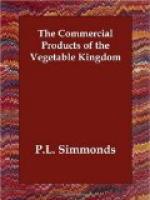In 1790, 813 casks, of the value of 47,025 dollars, were exported; and in 1791, 29,208 lbs. From 1803 to 1807, the annual value of ginseng shipped was about 123,000 dollars, and from 1820 to 1830, it averaged 157,000 dollars.
The following figures show the value of the article in subsequent years:—1831, 115,921 dollars; year ending 30th September, 1835, 94,960 dollars; 1837, 212,899 lbs., valued at 108,548 dollars; 1840, 22,728 dollars; 1841, 437,245 dollars.
The quantity shipped in 1839, from Philadelphia alone, was 317,443 lbs. In 1841, 637,885 lbs. were exported from the United States.
The value of that exported in the years ending 30th June, was 1844, 95,008 in dollars, and in 1845, 117,146 dollars; 110,000 lbs. were collected at Toledo, Ohio, in 1845. The value of the exports in the following years, ending June 30th, were—1847, 64,466 dollars; 1849, 162,640; 1849, 182,966; 1850, 122,916 dollars.
CORIANDER, CARRAWAY, AND OTHER SEEDS.
The fruits of anise, carraway, coriander, &c., (erroneously called seeds,) are in demand for various purposes.
CARRAWAY SEED is imported to the extent of 500 tons annually from Germany and Holland, the price being about 33s. per cwt. It is also now much grown in Essex and Kent. In the years 1848 and 1849, 7,000 cwt. of this seed was imported, of which nearly the whole quantity was retained for home consumption.
CORIANDER SEED is chiefly used by distillers, to produce an aromatic oil. The quantity imported annually does not exceed 50 tons, and it is brought principally to the port of Hull. It is also cultivated in Suffolk, Essex and Kent.
Of MUSTARD SEED the aggregate quantity imported annually is about 2,000 tons for home consumption, and the flour is used as a well-known condiment to food, &c., and in medicine; the average price being about 9d. per pound.
ANISE.—The fruit of Pimpinilla anisum, under the name of aniseed, is principally imported from Alicant and Germany (the first is preferred), but some is also brought from the East Indies. It is an annual plant, largely cultivated in Spain, Malta, and various parts of Germany, and also in the island of Scio, Egypt, and parts of Asia. The imports are not large; 192 cwts. paid duty in 1833, and 315 cwts. in 1840. About 60 cwts. are annually received at Hull from Germany. It is used to flavor liqueurs, sweetmeats, and confectionery of various kinds. Oil of aniseed is obtained by distillation from the fruit, and 1,544 lbs. were imported in 1839. About two pounds of oil are obtained from one hundred-weight of seed.
STAR ANISE, Illicum anisatum, is a native of the countries extending from 231/2 deg. to 35 deg. of north latitude, or from Canton to Japan. The capsules constitute in India a rather important article of commerce, and are sold in all the bazaars. Large quantities are also used in Europe in the preparation of liqueurs. 695 piculs of star aniseed were exported from Canton in 1850, valued at 8,200 Spanish dollars. 81 piculs of oil of aniseed were exported from Canton in 1845, and 105 piculs in 1850, valued at 11,900 dollars. 3,000 piculs of aniseed are exported annually from Cambodia.




